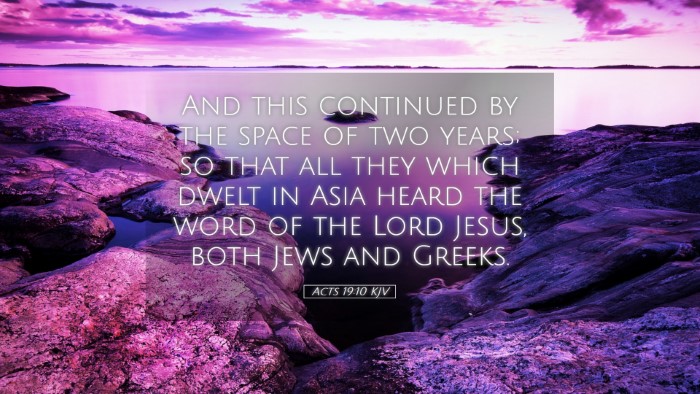Commentary on Acts 19:10
Verse: "And this continued by the space of two years; so that all they which dwelt in Asia heard the word of the Lord Jesus, both Jews and Greeks." (Acts 19:10)
Introduction
This verse is a profound testament to the effectiveness of Paul's ministry in Ephesus and the extensive reach of the Gospel during the early church. The significance of this passage transcends its historical context, providing insights into the nature of evangelism and the spread of faith in the early days of Christianity.
Contextual Insights
In the broader narrative of Acts 19, Paul encounters an array of challenges and opposition yet remains steadfast in preaching. This particular verse serves as a pivot: after two years of intense ministry in Ephesus, the consequences of his work emerge, showcasing a geographical and cultural impact among both Jews and Gentiles.
Duration of Ministry
Matthew Henry notes that the duration of Paul’s ministry in Ephesus allowed for deep roots of the gospel to be established. Paul was not just fleeting—his prolonged presence fostered a robust Christian community, suggesting that effective ministry often requires time for growth and maturation.
Albert Barnes elaborates that the two-year period indicates Paul's commitment. He was diligent in teaching and preaching, allowing for a comprehensive dissemination of Christian doctrine. This suggests that effective evangelism requires patience and perseverance.
Adam Clarke emphasizes the idea that time also implies dedication to teaching, not just conversion. The implication here is that Christian growth involves both evangelism and discipleship, which was central to Paul’s mission strategy.
The Reach of the Gospel
This verse illustrates the expansive reach of the Gospel during this period: "all they which dwelt in Asia heard the word of the Lord Jesus." Matthew Henry points out that "Asia" refers to the Roman province, not the continent as understood today. This geographical specificity is important: it highlights the incredible growth and spread of the early church.
Albert Barnes underscores that the phrase "heard the word" indicates not just superficial acquaintance but a genuine engagement with the message of Christ. This suggests a movement of the Holy Spirit empowering the evangelistic efforts of Paul and his companions, which brought about significant spiritual awakening in that region.
Adam Clarke provides a vital observation about the inclusivity of the audience: both "Jews and Greeks." This emphasizes the universal aspect of the Gospel, which transcends ethnic and cultural barriers, suggesting that the message of Christ was intentionally directed at all peoples.
Implications for Modern Ministry
Matthew Henry encourages modern ministers to take heed of the need for long-term commitment to their congregations. In a fast-paced world, the necessity of sustained teaching and pastoral care cannot be overemphasized.
Albert Barnes cautions against the culture of evangelism that lacks depth. True evangelical success involves not just the achievement of numbers but the nurturing of faith within individuals, leading towards a robust understanding of Scripture and its application in life.
Adam Clarke asserts that for contemporary believers, the call is to extend the Gospel’s reach into every community. Christians must embody the mission impulse shown by Paul, striving to share the Gospel with all and ensuring that their approach fosters transformation, bearing witness to the faith in practical ways.
Conclusion
Acts 19:10 serves as an inspiring example of the transformative power of persistent evangelistic efforts. Through the committed ministry of Paul, both Jews and Greeks were reached throughout Asia. This passage challenges modern-day believers to reflect on the depth and breadth of their engagement with the Gospel.
The insights drawn from collective commentaries emphasize the timeless principles of dedication, inclusiveness, and the holistic approach to evangelism and discipleship in our Christian witness.


